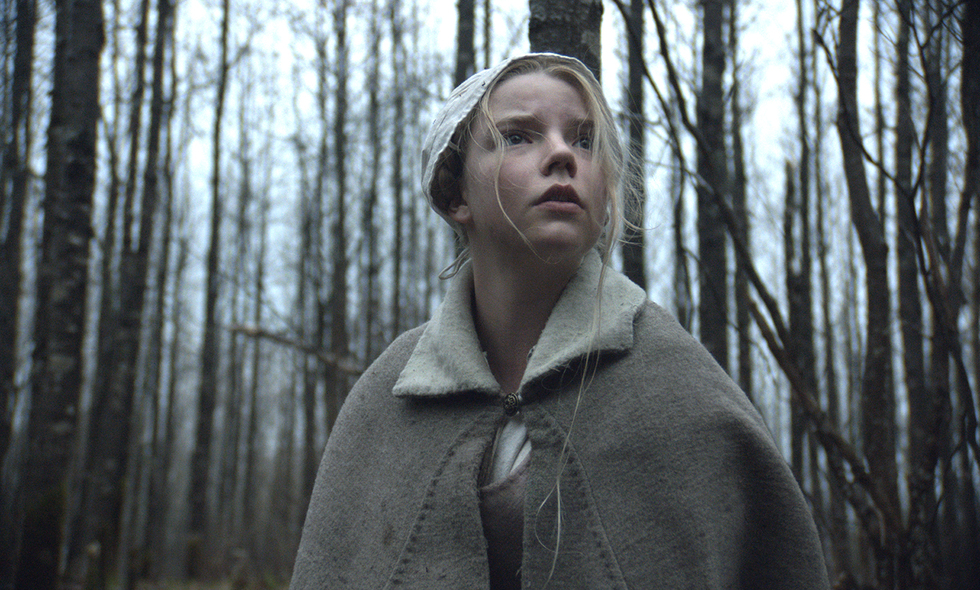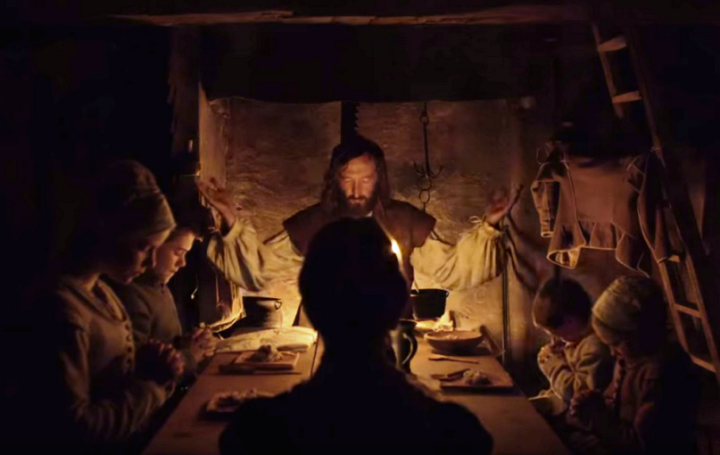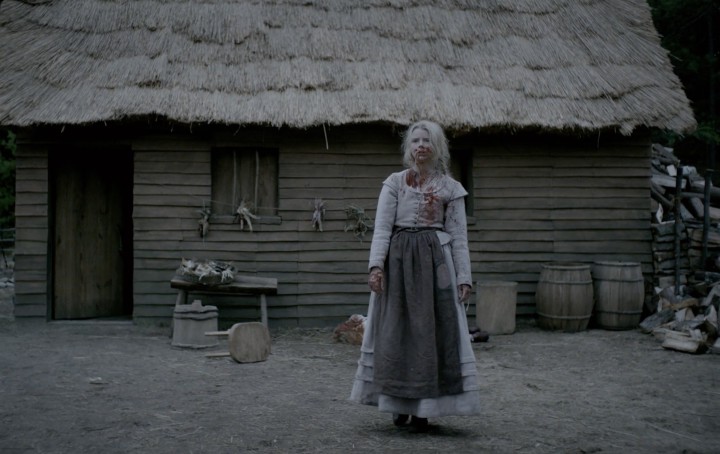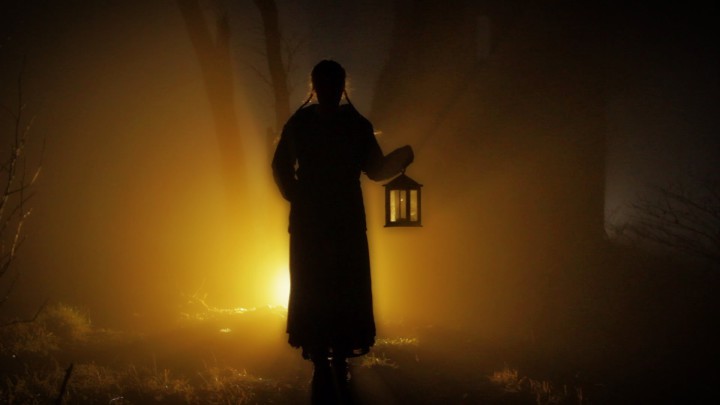This is a particularly difficult review for me, in the best way possible. I have written about some of the worst films of the last 10 months, but I have yet to come across a movie that I could genuinely effuse about — until now. The Witch is certain to be a divisive picture, and its handling of religious hypocrisy, women’s roles in a patriarchal society, and occult themes are likely to hurt its commercial appeal in a broad market. While the other critics I screened this film with were hesitant to recommend it, I have no such reservations. If the trailers have appealed to you in the slightest, go see The Witch immediately. This film epitomizes the image that Black Sabbath built a career on, but they probably would have soiled their tight British trousers at the bleakness and brutality on display here.
That statement is in no way intended to disparage a band (or musical genre) that I love deeply, rather it is an explication of just how effective this film is in restoring relevance to depictions of witchcraft on screen. Though the trailers may look standard for a modern horror film, The Witch represents a very unique form of revisionism within its given sub-genre. We’ve seen zombies and vampires reimagined in every conceivable permutation ad nauseam, but no earnest effort to reexamine Satanic witches through a modern lens has been made with any success since 1968’s Rosemary’s Baby.
Set in 1630, decades before the Salem Witch Trials, The Witch culls much of its script from contemporaneous historical records and trial transcripts. The antiquated dialogue may prove problematic for some viewers, but period authenticity is only a superficial manifestation of the film’s true objective: presenting a world of very real and literal sorcery, with all the contingent psychological fallout such a proposition implies. This film plays straight with the audience from its earliest scenes, offering a hypothetical scenario wherein the black magic described prior to so many people being hanged, burned or pressed to death in 17th century America occurs exactly as it was described in those witness testimonies, down to broomsticks, nocturnal Sabbaths and infanticidal blood rituals.
Rather than playing any of these salacious details for simple shock value, the film instead presents them with a matter-of-fact seriousness, deriving its dramatic tension from a place of character development, as opposed to gore and jump-scares. With the exception of the film’s climax, every instance of the supernatural presented on-screen has already been seen in the trailers. This leaves the cast of relative unknowns to carry the weight of the picture through a deliberately paced second act, and they more than rise to the occasion. Degenerating family dynamics redolent of The Shining take center stage as the titular witch’s subtle ministrations set a self-righteous family at each others throats, leaving adolescent daughter Thomasin (expertly portrayed by newcomer Anya Taylor-Joy) as the unfortunate scapegoat (pun intended) for her father’s desperate wrath and her mother’s mounting madness. Thus, the film skirts a very curious line. While most explications of the witch trial phenomena would try to rationalize these events as byproducts of schizophrenia, ergot poisoning or misdirected religious zealotry challenged by a young woman’s burgeoning sexuality, this story makes no bones about its position in such matters; for these characters, witchcraft is a tangible and inescapable threat.
The Witch is not a film for the squeamish, nor is it likely to appeal to religious fundamentalists or those threatened by feminist themes. Those seeking mindless action and gratuitous gore need look elsewhere, but any prospective movie-goer in search of a thought-provoking depiction of existential dread need look no further. Writer/director Robert Eggers’ feature debut has set an impressively high standard by which his future efforts will be judged, and every accolade and award The Witch garnered at Sundance was well deserved. If he sold his soul to Satan in order to make this film, he probably got the better end of the bargain. Rated R for scenes of sexuality.







no earnest effort to reexamine Satanic witches through a modern lens has been made with any success since 1968’s Rosemary’s Baby.
I’d call The Lords of Salem successful.
You’re not the first person to mention that correction, but unfortunately I haven’t gotten around to seeing it yet.
Well, I just said that what The Witch mostly did was make me want to watch The Lords of Salem — which is more like a weird mix of Kubrick, KR, and Dario Argento along with things that are plain Rob Zombie.
Well, I like all of those things, so I guess now I’m going to have to watch it.
Wait, are you implying that Rob Zombie is an auteur? I don’t entirely disagree, but I think I hear Andrew Sarris rolling over in his grave…
That presupposes that auteur is a measure of quality, and I don’t think it is. I think it merely means that the filmmaker has an identifiable and consistent signature. I don’t think anyone would deny auteur status to Ed Wood or Hugo Haas and by any rational measure, their movies are pretty terrible. Hollywood directors like Sam Wood made better movies, but are not auteurs. (If you can make a case for Wood, I’d be glad to hear it. And it may be possible. I once read Ignatiy Vishnevetsky describe what makes a Stephen Roberts film a Stephen Roberts film, and though I probably have a better knowledge of Roberts’ work than most people, I had never put this together…but he was right.)
Granted, Zombie is essentially a fan who landed in the position of making movies, so there may be a certain fan fiction quality (well, you could say the same about Tarantino) to his movies. I suspect he is unique in copying scenes from Frankenstein, the 1932 Murders in the Rue Morgue, and Carrie (the real one) — all in the same movie. (The Haunted World of El Superbeasto.)
I’m not remotely suggesting that designation as an auteur is any reflection of a director’s proficiency or the quality of his or her cinematic output, simply that if Sarris were writing The American Cinema today, Zombie would probably not garner a mention. Bear in mind, we’re talking about a man who took years to come around on Kubrick…
Ah, but the difference between Sarris and most is that he was constantly re-evaluating and had no problem saying he’d been wrong.
Absolutely correct, and I suspect he would’ve appreciated Rob Zombie to an extent. I’m just not sure he would’ve warranted inclusion on Sarris’ list of “Fringe Benefits” or “Oddities, One-Shots, and Newcomers.” Just to clarify, I am personally a fan of Zombie’s oeuvre.
Hopefully, not “Likely Likable.” Maybe “Expressive Esoterica?”
I was surprised to find that at today’s first matinee (following last night’s initial showing), only one other person was in the auditorium. Because of all the hype, I thought it might be packed. I haven’t seen this feeble a turnout since Krampus. I wonder if it’s a religious backlash against the spirit of the film. We get all the faith-based movies here in Sioux Falls.
That doesn’t shock me. Even though I saw it at a 9 a.m. press screening, it doesn’t exactly strike me as a matinee picture. But I think you’re on the money in estimating that religious backlash will hurt this film’s box-office, irrespective of its quality. To be honest I was kind of expecting some protests, especially after the Satanic Temple endorsed it. I should have written it up as a faith-based film for neopagans.
I was surprised that the theater I was at was somewhat packed and nobody walked out.
And yet, taken in a certain light, I feel like someone could probably put together in argument forwarding this as the most complex, perceptive film on Christian faith since CALVARY.
It seems to me that the film definitely takes a stance on Christian faith, all right…just not a positive one.
I was impressed with the film’s atmospherics and verisimilitude. I t does help to know a bit about the Salem trials about a half century later, and, to have read “The Crucible” by Arthur Miller. Banishment was real, if Hawthorne is to be believed in “The Scarlet Letter”, wherein Hester was shamed and sent to live outside the village. The inclusion Of “Tituba” in “The Crucible” suggests that some of the slaves may have brought in witchcraft from elsewhere (It’s believed that the earliest black slaves were brought into New England as soon as The early 17th century). In my readings, I haven’t found much about “burnings” as this reviewer suggests. About 20 female witches were hanged and one male, Giles Corey, was “pressed” to death with stones and rocks. “Ergotism” has been discredited (the notion that some kind of fungus affected the grain products of the colony and drove the people mad.) Much has been made of the Puritan urge to “purify” these primitive villages. Some writers have suggested that some of the Native Americans may have practiced witchcraft. Some have suggested that kids (like this one) simply needed relief from the stultifying dogma and dreary, religion-obsessed adults and headed for the woods (see “Young Goodman Brown” by Hawthorne). But, so much of this seems real, if you have read these sources and studied the era. And the director, as most fine artists, does so much with suggestion as opposed to blatant gore.
It would indeed be more accurate to describe witch burnings as a predominantly European phenomenon.
https://www.youtube.com/watch?v=onkbubwAqRQ
While the works of Miller and Hawthorne (who changed the spelling of his name out of guilt over his great-great-grandfather’s role as a judge in the Salem trials) were no doubt influential on the script, it is worth noting that this film is set more than 60 years prior to the events in Salem. However, writer/director Robert Eggers has stated that he derived much of the film’s period-accurate dialogue and historicity regarding 17th century witchcraft and possession from the writings of Cotton Mather, born three years after the events of the film and a prominent supporter (some have said catalyst) of the Salem witch trials, so the film is heavily based on those later events.
As to the verisimilitude and atmospherics of the film, Eggers previously worked as a costume and production designer, which explains the painstaking attention to detail evident on screen. The costumes were hand-sewn with materials accurate to the period (at least insofar as budgetary constraints would allow) and the set was predominantly built using period tools and techniques. Cinematographer Jarin Blaschke shot with available light, contributing to the shadowy naturalism of the film’s muted color palette. Blaschke has stated that he shot this film predominantly on one lens, and chose a 1.66:1 aspect ratio to emphasize the prominence of the woods in his largely symmetrical and static compositions, lending the film a sense of visual tension and claustrophobia.
Alright, I know Xanadont went to see this last night (I spoke with him in The Carolina lobby), but when will he weigh in on it?
I wish I could have seen it not knowing a thing about it, but that’s what you get for reading about upcoming movies. I suspect that the initial atrocity, in the first ten minutes, would have put me on edge for the rest of the film … but of course it was freely revealed by most of the reviews. And then the poster and the trailer gave away more. A young Puritan woman roaming stark naked through the woods at night has clearly gone through some major changes, and seeing her in repose calmly spattered with blood only confirms it. It’s like wondering how “Psycho” would have affected me if I hadn’t been told the entire story beforehand, although it was still good for many repeat viewings. I’m not sure that “The Witch” will be good for many repeat viewings, although I would like to see again that weird little sideways sort of dance (or whatever it was) that Black Philip did early in the film. Goats are so cool.
Ken speaks the truth and I’ll happily oblige. There were actually four total in my party come show time and feelings were mixed all around, though none of us outright regretted our time spent. I was surprised and happy at how many people came out for the Tuesday night showing– I’d say there were upward of 50 in attendance and there was no shortage of impassioned conversation following the film. I can’t say if anyone walked out (had I chosen our seating I’d know) but the trio in front of us expressed some choice words as the credits came up. On the whole I think reserved praise ruled the day which more or less represents my own feelings.
I had some issues with The Witch and not all of them minor, but I think liked it more than I didn’t and admired more than I actually liked. There were stretches where I felt that were it not for Anya Taylor-Joy’s work as Thomasin the whole thing would be borderline unwatchable. I applaud the commitment to authenticity so far as set design and costuming, and even the language, though I must say there were several moments of unintentional humor that weren’t helped any by all the Thee’s and Thou’s and etcetereth. (“Hast thou maketh an unholy bargain with the black goat?!” – or something to that effect). I found the movie uneven simply because not everything worked for me the way it was intended. And yet I have to say that certain aspects were mighty impressive indeed. The score was quite good. The pacing didn’t bother me as much as I feared. And the earlier sense of young Jonas poorly delivering (poorly written) stage lines is nearly wiped out by his final and powerful climactic scene. The “crow scene” was as striking and expertly framed and achieved as anything to come along in a while. (The imagery reminded me of the difficult and arguably trashy cult film Begotten) It all added up to a movie that I found interesting if unspectacular, but I like its presence in modern horror.
I freely confess that I am waiting — apparently in vain — for someone who isn’t me to say, “It’s really slow and pretty boring and while I don’t regret seeing it, I’ll never see it again.” Bonus points for anyone who calls it Witch’s Cut-off.
“It’s really slow and pretty boring and I’ll never see it again.”
Sorry not to agree with you exactly Ken, but I kind of do regret seeing it, or at least seeing it in the theater rather than some of the other movies that are playing right now. I felt like the acting and cinematography were exceptional but the overall film was just empty. I never felt any connection with the characters, and the moments that I’m guessing were meant to cause me emotion just felt like images in a slide show. I will have to give The Lords of Salem a try.
I think it’s an excellent film. Multiple elements of puritan folklore and legend get adapted to screen in such a unsettling and tangible way. A great exploration of the puritan’s fearful psyche and, as the reviewer here said, existential dread. Creepy and beautiful, authentic Witchcraft film that adds great depth to the witch archetype. Like Blair Witch did, but more in tune with real fears and mania that is part of our culture’s past. The Blair Witch taunted and murdered, but this (or these) witch seeks to corrupt and consume, soul and body. It was a patiently told story, atmospheric with a unique script and dialogue. Gratifying and effective character development. I’m glad I went into it nearly blind. I went to see Son of Saul tonight and it’s already gone from the theater, so I watched this instead.
Some of the emotional gnashing of teeth scenes were a bit long and exhausting for me to see, but that’s not necessarily a mark against a film, It’s just a thing that I grow tired of quickly in movies.
Unlike what I’ve heard others say, I don’t think it portrays Christianity unflatteringly. It really honored the christian paradigm in a lot of ways.
Also, I noticed the father was left handed. They seemed to emphasize that by shooting him from behind and above while he chopped wood. Nice touch.
so was the daughter a witch all along??
Err…
Stuck in beer mode, huh?
I was replying for both of us.
I was unclear which Hardy Boy was speaking.